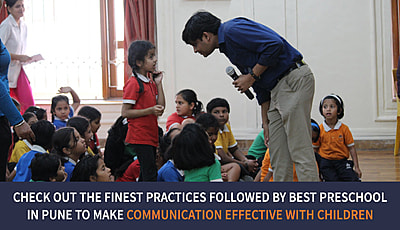The Finest Practices Followed by Best Preschool in Pune to Make Communication Effective With Children.

Communication is the bond that cements and holds relationships together, in families, neighbourhoods, societies, and nations. The importance of effective and positive communication with children cannot be undermined. It lays the foundation for their lifelong communicative and interactive patterns that lead to good interpersonal interactions, the ability to maintain associations and relationships, and professional success. There are ways to enhance communication beyond just words and make it deeply meaningful with children to foster understanding, empathy and sensitivity. Pre-schools in Pune, among which MIT Gurukul is a premier institution, employ the following methods for making communication effective with children:
- Listen to understand the children: Teachers listen attentively and understand what the child is trying to say. They listen without interrupting and nod encouragingly to make the child comfortable in sharing his/her thoughts, emotions or insights. Sometimes the teachers also kneel down so that they are at eye level with the child and can make a close emotional bond.
- Pick up the emotion: While communicating and listening with children, pre-school teachers and other attending staff also make an effort to tune into the emotions the child is trying to convey. Many times it is the non-verbal cues in a child that need to be understood such as tone of voice, facial expressions, body language etc. International schools in Pune, like the MIT Gurukul, also employ counsellors who are trained in child psychology and who also make informal play-way methods of assessing children’s communicative patterns to help in positive reinforcements in communication patterns.
- Acknowledging the child’s feelings: Empathy and sensitivity go a long way in making a child deal with any stress or unhappy state of mind. Listening to their emotions and feelings, the pre-school staff let the child get connected with her own mind. This helps the child share with confidence and develop trust in the listening adult’s ability to offer suggestions. This provides a comforting environment in which the child learns to dissipate negativity into positivity. This is also a good way to teach children how to cope with situations that may not be to their liking, by talking openly about them.
- Understanding the communication from the child’s point of view: We often ignore the fact that negative behaviour or communication by a child may actually be their plea to get reassurance, comfort, security and love from the parents or teachers. By showing benevolence, care and love, pre-school staff, like the team at MIT Gurukul, extract from the children the real reasons that upset them. Without judging or reprimanding they then facilitate the children to overcome the challenging situation. For this, open and free communication patterns between teachers and young students work well.
- Do not shame the child: Children will feel comfortable opening up about their thoughts, feelings and problems with adults who do not shame them, do not judge or put labels on their feelings, and who do not put down the child by negating their state of mind. The non-judgemental approach in communication with young children helps to make a positive impression on the children. Such children grow to be emotionally responsive, talk about their issues with a trusted individual over growing up years and harness optimism and trust.
- Talk to the child about many topics: Talking about birds, trees and flowers, or animal species helps to grow the child’s understanding about protecting the environment. Discussion about helping one’s mother in small chores at home like putting the books in place after studying makes them feel responsible. Communicating about different topics in this way raises the child’s social, intellectual and emotional quotient. This is helpful in the long term in developing children into responsible adults and members of society.
Conclusively it can be said that making communication effective, empathetic, meaningful and non-judgemental is crucial for the positive personality development of children. Communication patterns should be started early so they can lay the foundation for the holistic development of children for their entire life. We encourage parents to visit the school and discuss with the pre-school staff about effective communication patterns and translate the same within their home environment so that the child obtains more benefits.


